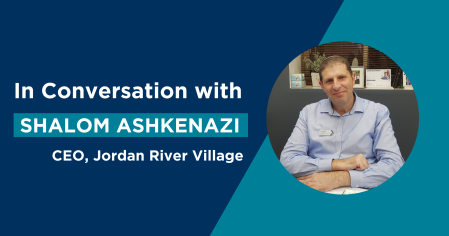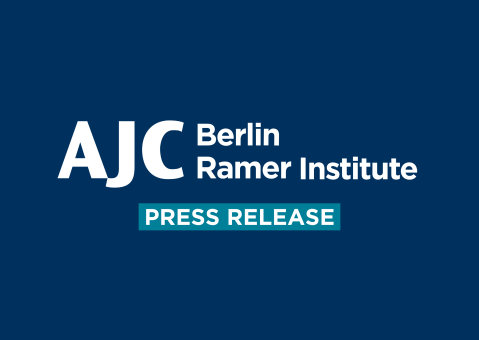Share on
The trauma caused by October 7, 2023 is ongoing and affects all parts of Israeli society. However, some groups are particularly vulnerable and receive little international attention. Before October 7, Jordan River Village worked with children in Israel who have disabilities or chronic illnesses and their families to provide them with weekend and summer stays in a safe environment. Shalom Ashkenazi, CEO of the Jordan River Village, tells us how the work of the Jordan River Village changed after October 7: families who had to leave their homes in Israel's border communities found a relatively safe place to stay at the summer camp, and the team also worked with freed hostages and other hostage families. To this day, Shalom and the Jordan River Village team continue to navigate the new reality that Israel has found itself in throughout the past year.
AJC Berlin: Jordan River Village has supported children with chronic diseases before October 7. Please explain your work prior to the terror attack and how it has changed since.
Shalom Ashkenazi: Jordan River Village has three missions. Our main mission is to host kids with medical conditions for three to four nights, who would be unable to attend normal summer camps. We host them here at Jordan River Village and help them to celebrate life in spite of chronic illness. The fact that they are chronically ill or have disabilities shouldn’t prevent them from having fun. We challenge them to achieve their goals, and the kids feel the positive influence of their stay at Jordan River Village for several months afterwards.
Our second mission is, as I always say, not to be a piece of land, but a land of peace—a land of peace between Jews and Arabs, religious and secular people, the left and the right, poor and rich people, people from the suburbs and from the center of Tel Aviv. We want everyone to meet each other and unite.
Thirdly, and this is connected to October 7, we attend to national missions. On October 7, at 7:30 a.m., we realized that Israel was under missile attack and under a terrorist attack like we had never known before. We started collecting the names of former campers who live in the South near the border with Gaza and on the Northern border. We offered their entire families the opportunity to come and stay at Jordan River Village to rest. At the time, we didn’t expect that the war would last eleven months. On October 8, we already hosted 20 families who were displaced, and they stayed with us for 49 days.
After 49 days, we started to host children who had returned from captivity. We hosted five sessions with children who had been held captive, and with family members of children still in captivity.
AJC Berlin: What does your work with the freed hostages and their families look like? What are their needs, and where do they need help?
Shalom Ashkenazi: Before the children who had been released arrived, we had an orientation day, during which we trained our counselors on how to treat the children who returned from captivity. Firstly, they couldn’t speak Arabic around the children because it could have reminded them of captivity. Secondly, no child was to be left alone after dark. We also added additional lights in the village. A social worker advised us not to bring up the topic of captivity at all. We should only speak about it if the children brought it up. We needed to be very careful to avoid questions such as, “How did you feel in captivity?” or “What about your father, who is still in captivity?”
I want to give you an example. We hosted a little girl, who was nine years old at the time. When she arrived together with her family members, she was very silent, almost mute. She held her relatives' hand and spoke very quietly. After three hours, she told her family member, “You can go to your bunk! I have my counselor.” She even started singing songs by Beyoncé. Another family member also came with her, and when we asked her why, she told us that she had quit school and her job after the girl had been released from captivity, to spend all her time with her. The day after they arrived at Jordan River Village, she called her boyfriend and told him to collect her because the girl was doing very well.
We hosted another family where several family members had been in captivity. The mother was released two days after the daughter. They sat in the dining room [at Jordan River Village], and all of a sudden, a woman who is a relative of a hostage, came in and introduced herself. The daughter of the family replied that she had spent 49 days of captivity with the woman’s relative. That was the first time we knew that this female hostage was alive. This is something we discovered in the village. We experienced nothing less than miracles when we hosted the former hostages.
AJC Berlin: Many families in Israel are displaced due to the ongoing war, in the North and in the South. How has the displacement affected these families?
Shalom Ashkenazi: We have a special needs school, which we opened for displaced families. We also held sessions with displaced families and refugees. They have no knowledge of when they are going to go home, and when you don’t know that, you don’t know if you want to start the new school year in our region or if you want to wait until you can go home. There is a lot of crime among the youth in the hotels, lots of drugs and sexual abuse. The parents have to live with their children and all of their stuff in one small room. There is a lot of sadness. I know from my own settlement that there were people who died of sadness. They couldn’t cope with the situation. They had built a house and a farm on which they had worked for many years, and then everything collapsed within one day. There is no hope. We have an employee from Kiryat Shmona in the North who started last week. She spent five months in a hotel in Eilat, in the South. She decided she had to go back North and went to Kiryat Shmona to her house, which was destroyed—all the windows were broken—so she decided to come to this region, to Tiberias. She decided she wouldn’t go back home to Kiryat Shmona.
I’ll tell you something personal: My daughter is getting married, and on the one hand, I’m very happy, but on the other hand, I ask myself how I can be happy and dance when our brothers and sisters are fighting and suffering in the tunnels in Gaza. I don’t see any light at the end of the tunnel. I’m an observant Jew, and I pray three times a day that God will bring back the situation to October 6. I really think that the State of Israel is in big trouble.
AJC Berlin: What does your work look like today? What impact do October 7 and the subsequent war still have on the children in your programs?
Shalom Ashkenazi: It was very difficult for us to hold counseling sessions from October to December [2023], because we thought that kids with disabilities and special needs needed to go back to their routines. We decided that even though we wanted to help the hostage families and displaced families, we also wanted to go back to our regular sessions. We adapted our sessions to the current situation and considered that children with PTSD might be in the room. We started our regular sessions again in January, but we also have schools that work for displaced families with special needs children year-round. After the massacre in Majdal Shams, where many kids were killed, we approached them and offered to host them free of charge. Now we are slowly going back to our routine because routine is recovery. It is a miracle that we got through the summer without any sirens in the village; we only had sirens when there were no children in the village. It feels like God protected us. However, we had to have all activities in close proximity to bomb shelters. We also started construction work on three additional big shelters in the village because we want to make sure that every child in the village could run to a shelter in under one minute. This costs around 2.5 million shekel. We raised most of the money because we think it’s important that we can tell the parents that we are able to protect their children. We also started a program for children with PTSD. There are currently nine million candidates in Israel for a PTSD program. I assume I have some form of PTSD myself, and so has my child, who fought in Gaza, my family, who waited for their children to return from the army, and my neighbor’s son, who was injured.
AJC Berlin: What long-term changes do you see in Israeli society due to October 7?
Shalom Ashkenazi: I think it will take at least a generation or two to fix Israeli society. I’m not talking about the economy—I trust the people to do that—but the trust in your country, the trust that your country will protect you and that the army is still a strong army. I think it is a strong army, but you must have the confidence of the whole population.
For my daughter’s wedding, we made some tables wheelchair accessible because some of the soldiers had to have limbs amputated. This situation is going to affect Israeli society for many years to come. I believe and I pray that the sentence “Together we are going to win” is true. You need to live that statement and not just say it and then go fight your neighbor because they think differently from you. The State of Israel and its citizens must understand that something has to change, and I think that our friends and relatives understand this better than we do. I want to thank the people outside of Israel who support Israel, Jewish or not, religious or not. I’m moved by the fact that there are people who live 10,000 kilometers away and worry about our tiny country. We’re blessed to have you.



